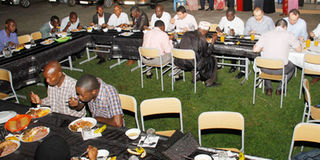Iftar is more than food

Guests treated to Iftar (breaking fast) at Nile Public Dialogue in Muyenga. Photo by Abubaker Lubowa
What you need to know:
FUN. Breaking the fast comes with perks as Roland D. Nasasira finds out.
I imagine that at some point in our lives, we wish and love to see the world a much better place where religious, tribal, cultural and boundary differences don’t exist; a world where we live at peace with our neighbours. But how possible can this be?
It is only when, as Issa Kirarira, the secretary general of Nile Dialogue Platform puts it, we encourage and accept that the first identity that should unite all people is recognising that people were created in God’s image and should therefore show affection to one another irrespective of tribal or religious denominations.
Nile Dialogue Platform is an organisation that is involved in interfaith and intercultural dialogue that enables followers of different faiths to meet, talk, collaborate and live in the same place. From this, those that meet are able to listen, learn and understand the other groups and find a point of agreement, be it shared or not. This, Kirarira explains, is expected to be carried out in an atmosphere of peace, freedom and openness, equality, tolerance, righteousness, sincerity, love, respect and with good intentions.
The source of inspiration of interfaith and intercultural dialogue, is influenced by 74-year-old Fethullah Gulen, a prolific writer, poet and Turkish Islamic scholar who was born in Erzurum in Eastern Turkey; and in his works, he was able to inspire generations in Turkey and beyond with a message of peace and social harmony.
Their offices in Muyenga is where people of different religious denominations who go along with their friends and sit on round tables on selected evenings during Ramadhan to break their fast. On other days when it’s not Ramadhan, two or three days are chosen in a month for dialogue. There is no restricted dress code to join these meetings. Everyone dresses decently, including Muslims who dress so smartly in Hijabs and Jalabibs- attire that covers the whole body except the face for women.
Ambience
While other people are invited by the organisation to break their fast, others are called on by their friends. Listening in to the murmurs from conversations that go on, majority, especially men, seem to be buried in politics while women mind their own business. Others bury their heads in their smart phones.
“When we meet at such gatherings, we emphasise unity in diversity. We also believe that we cannot fight extremism without tolerating one another and at the end of the day, we exchange gifts, build great friendships after knowing what each one of us does and also do business,” Kirarira says.
After prayers and meals at 7pm, it is then that people get to know each other’s particulars. What Kirarira and the organisation believe are the evils of humanity that include disunity, ignorance and poverty are brought to table to debate for the way forward.
Knowledge about Islam
For Musa Kaggwa who got to know of this get together through a friend, it goes beyond sharing meals. “When we meet here, we study Islam. We read books written by Fethullah Gulen, the founder of the organisation and those that have historical information about the life of Prophet Mohammed,” Kaggwa explains, adding that they also read books that guide on how to interprete and understand dreams and the Islamic way of living while treating other people well.
Lessons learnt
Kirarira adds; “without education, we can never succeed in eliminating evils that affect society, including poverty which can make one come closer to a non-believer, if not one. When we gather, we learn how to give to one another so that the society can avoid poverty. We hold discussions based on genuine facts about what happens in society,” Kirarira concludes.
For Ingrid Asasira, such gatherings are not only about food and making friends but also having fun. She adds that; “here, they don’t segregate whether one is Christian or Muslim. It accords one an opportunity not to feel out of place and network.”
Unlike Asasira, Levis Karugaba, a law student, says the whole idea of a group of mostly young people coming together to discuss poverty eradication and to preach peace, in present days where society is ignorant about Islam as a religion of peace is what is important because it promotes unity among all religions.
This season
Whenever it is Ramadhan, most Muslims focus on prayer and fasting. For others, it is time to go beyond the Koranic teaching and make friends or learn from others.




